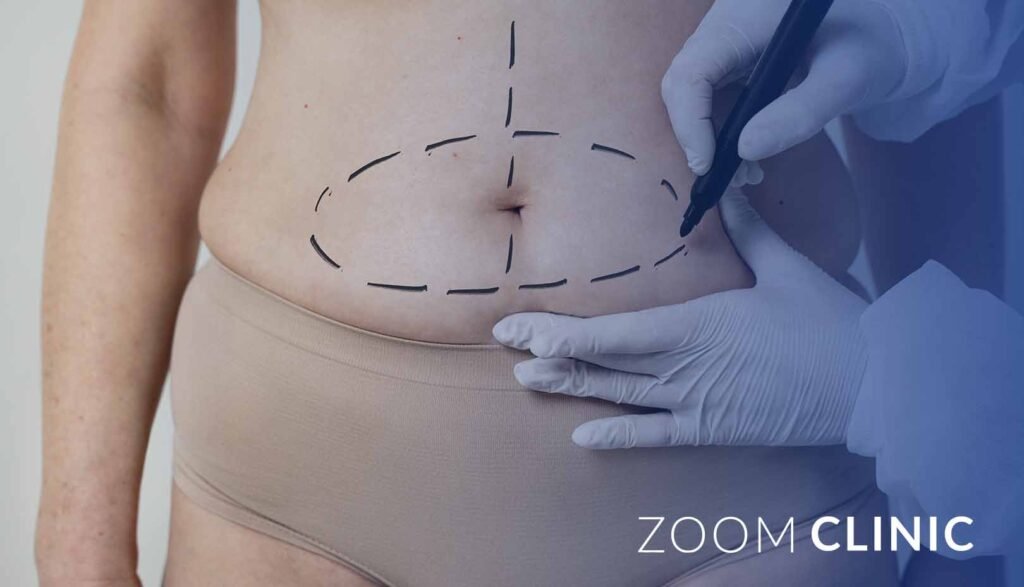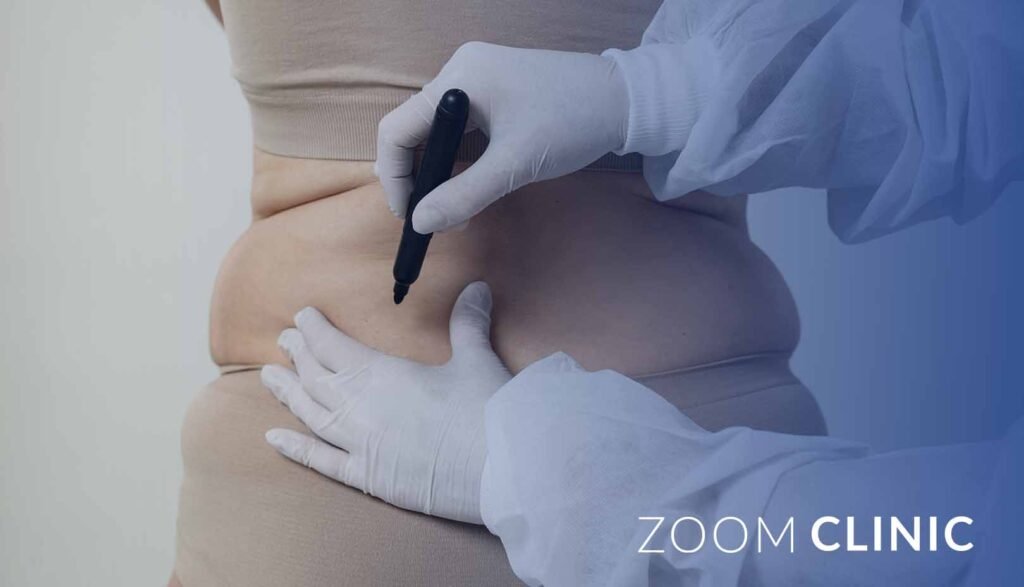Got questions about liposuction? This article covers the top liposuction FAQs: answering your most common questions. Learn what to expect, who it’s for, and how it works.
Table of content
Key Takeaways
- Liposuction is a surgical procedure focused on removing stubborn fat deposits from specific areas of the body to improve shape and contour, not a weight loss solution.
- Ideal candidates for liposuction are adults close to their ideal body weight with firm skin, and a consultation with a board-certified plastic surgeon is essential to determine suitability and manage expectations.
- The results of liposuction can be long-lasting if the patient maintains a stable weight and healthy lifestyle, though factors like aging and future weight fluctuations can affect overall body contour.
What is Liposuction?
Liposuction surgery, often referred to as lipoplasty or body contouring, is a surgical procedure designed to remove stubborn fat deposits from specific areas of the body. This fat removal technique aims to improve body shape and contour by targeting areas resistant to dieting and exercise. Commonly treated regions include the stomach, thighs, arms, and more.

During the liposuction procedure, a thin tube called a cannula is inserted through small incisions in the skin. The cannula is used to break up fat cells and suction them out of the body, effectively removing subcutaneous fat. This process can significantly enhance the contours of the body, providing a more sculpted appearance.
Liposuction is a cornerstone of plastic surgery procedures for those looking to achieve a more defined body shape. Whether it’s traditional liposuction or more advanced techniques like laser-assisted or ultrasound-assisted liposuction, the goal remains the same: to remove stubborn fat and improve body contour.
Who is an Ideal Candidate for Liposuction?
Not everyone is a perfect candidate for liposuction. Ideal candidates are adults who are within 30% of their ideal body weight and possess firm, elastic skin. It’s crucial that individuals are generally healthy and do not have severe medical conditions that could affect the healing process. Additionally, non-smokers are preferred since smoking can complicate recovery.
Liposuction is best suited for those who have specific areas of unwanted fat, such as belly fat, that are resistant to diet and exercise. It is not a weight loss procedure or an alternative to losing weight. Therefore, individuals with a higher BMI may not be suitable for this procedure due to the limited amount of fat that can be safely removed. Women are often advised to complete their childbearing before undergoing liposuction to ensure the best long-term results to lose weight.
A consultation with a board-certified plastic surgeon determines if you are a suitable candidate for liposuction. Experienced plastic surgeons can provide personalized advice and ensure that you have realistic expectations about the outcomes of the procedure. This consultation is a critical step in making an informed decision about undergoing liposuction.
How Much Fat Can Be Removed?
One of the most common questions about liposuction is how much fat can be removed during a single procedure. The American Society of Plastic Surgeons recommends a maximum of 5 liters of fat be removed in one session. This amount can vary based on the individual’s body mass index (BMI), the area being treated, and the patient’s aesthetic goals.
The volume of fat removed can differ from one body area to another. For example, larger amounts of fat are typically removed from the abdomen compared to areas like the arms. It’s important to note that liposuction is not a method for losing weight but rather a procedure for removing stubborn fat deposits and contouring the body.
Patients undergoing liposuction generally experience a fat loss ranging from 1 to 3 pounds. While this might seem modest, the procedure can lead to significant improvements in body shape and contour, particularly in targeted areas where diet and exercise have failed to make a difference.
Is Liposuction a Weight Loss Solution?

Many people mistakenly believe that liposuction is a weight loss procedure, but this is not the case. Liposuction is designed to remove stubborn fat from specific areas of the body that are resistant to diet and exercise. It is most effective when performed on individuals who are near their desired weight and looking to achieve a more contoured body shape.
Maintaining the results of liposuction requires a balanced diet and regular exercise. While the procedure can permanently remove fat cells from treated areas, it is essential to prevent weight gain to maintain the results. Therefore, liposuction should be viewed as a body contouring tool rather than a weight loss solution.
Types of Liposuction Techniques
Liposuction encompasses various techniques designed to remove excess fat from specific areas of the body, enhancing body contour. Traditional liposuction, also known as tumescent liposuction, is the most common method. This technique involves injecting a solution containing lidocaine, epinephrine, and saline to liquefy fat, making it easier to extract.
Laser-assisted liposuction is another popular technique that uses laser energy to liquefy fat. This method is less invasive and can also promote skin tightening, making it ideal for smaller areas. It offers the additional benefit of skin tightening, which can be particularly useful for individuals with loose skin.
VASER liposuction utilizes ultrasound waves to emulsify fat, resulting in a less traumatic experience for the patient and quicker recovery times. This technique is praised for its precision and effectiveness in removing fat from targeted areas while minimizing damage to surrounding tissues.
Each technique offers distinct advantages and is selected according to the patient’s specific needs and goals. An experienced plastic surgeon can recommend the best liposuction method to achieve the desired results.
Does Liposuction Hurt?
Pain is a common concern for those considering liposuction. Fortunately, the procedure is typically performed with local anesthesia to minimize discomfort. Tumescent liposuction, for example, involves injecting large amounts of a dilute local anesthetic to enhance comfort and reduce bleeding. Some patients may also opt for sedation to further alleviate discomfort during the procedure.
Post-surgery, patients might experience minimal pain due to the preemptive analgesia provided by local anesthetics. Non-steroidal anti-inflammatory drugs (NSAIDs) are often prescribed to manage pain after the procedure. While some soreness and discomfort are expected during the recovery period, these symptoms are generally manageable with proper pain management techniques.
What to Expect During Recovery
Recovery from liposuction varies depending on the type of procedure performed. Traditional liposuction typically requires a recovery period of 4 to 6 weeks, while laser-assisted liposuction may only require 1 to 2 weeks. Most patients take a few days to two weeks off work to recover adequately.
During the first two weeks post-surgery, patients commonly experience swelling, bruising, and mild discomfort. These symptoms gradually improve, and by weeks two to four, patients can usually start light to moderate exercise. Compression garments are essential during this time to minimize swelling and promote healing.
Complete recovery, including the reduction of all swelling and full skin tightening, can take up to three months or more. Gentle walking soon after surgery is encouraged to enhance circulation and reduce the risk of blood clots. Following the doctor’s recovery plan is crucial for optimal healing and achieving the best results.
Potential Risks and Side Effects
Like any surgical procedure, liposuction carries potential risks and side effects. Common side effects include infection, scarring, and changes in skin sensation. Other possible complications include asymmetry, blood clots, and allergic reactions to anesthesia or other medications used during the procedure.
Serious complications, though rare, can occur. These include fluid collections known as seromas, nerve damage leading to temporary or lasting numbness, and fat embolism, where fat enters the bloodstream and causes blockages.
Understanding these risks and making an informed decision about liposuction requires consulting with experienced plastic surgeons.
How Long Do Results Last?

The results of liposuction are generally long-lasting if the patient’s weight remains stable. Fat cells removed during the procedure are permanently eliminated, but remaining fat cells can enlarge with weight fluctuations, leading to changes in overall body fat. Therefore, maintaining a healthy lifestyle is crucial for preserving liposuction results.
While gaining weight a few pounds may not significantly impact liposuction results, substantial weight gain can lead to noticeable changes in treated areas. Certain areas, like the abdomen and thighs, may experience changes over time, particularly with significant weight fluctuations.
Aging can also affect the long-term results of liposuction by reducing skin elasticity and muscle tone. However, with proper weight management and a healthy lifestyle, the benefits of liposuction can be enjoyed for many years.
Impact on Future Pregnancies
One common concern is whether liposuction affect pregnancy. The good news is that liposuction does not interfere with having children. Women can get pregnant after undergoing liposuction without any adverse effects on their ability to conceive or carry a pregnancy to term.
However, it is generally recommended that women wait until they are done having children before undergoing liposuction to ensure the best long-term results. Fat removed during liposuction will not return to the treated areas after pregnancy, but weight gained during pregnancy can affect overall body contour.
Will Fat Return After Liposuction?
A common question is whether fat will return after liposuction. The procedure removes fat cells permanently, meaning the fat cells treated do not regrow. However, remaining fat cells can enlarge with weight gain, leading to an increase in overall body fat.
Regular exercise and a healthy diet are crucial for maintaining the results of liposuction. This lifestyle change helps prevent new fat gain and ensures the long-term success of the procedure.
Recognizing that liposuction is not a substitute for a healthy lifestyle is essential. While the procedure can help remove stubborn fat, maintaining the results requires ongoing effort and commitment to healthy living.
Summary
In summary, liposuction is a cosmetic surgery procedure designed to remove stubborn fat deposits and improve body contour. It is not a weight loss solution but rather a tool for enhancing body shape in targeted areas. Ideal candidates are generally healthy, non-smoking individuals within 30% of their ideal body weight.
The results of liposuction can be long-lasting with proper weight management and a healthy lifestyle. While there are potential risks and side effects, consulting with an experienced plastic surgeon can help ensure a safe and successful procedure. If you’re considering liposuction, take the time to educate yourself and make an informed decision.
Get the special offer today from Zoom Clinic
Read Also:
A Comprehensive Guide to Liposuction
Reconstructive Surgeries After Major Weight Loss
Frequently Asked Questions
Is liposuction a weight loss procedure?
Liposuction is not a weight loss procedure; it is designed to remove stubborn fat from specific areas of the body. It should not be considered a substitute for weight loss methods.
How much fat can be removed during liposuction?
A maximum of 5 liters of fat can be safely removed during a single liposuction session, according to the American Society of Plastic Surgeons. This limit ensures patient safety while achieving desired body contouring results.
Does liposuction hurt?
Liposuction is generally not painful due to the use of local anesthesia that minimizes discomfort during the procedure. Pain management techniques are also employed to help with any discomfort after surgery.
Can I get pregnant after liposuction?
Yes, liposuction does not affect your ability to become pregnant. You can conceive after the procedure without any complications related to it.
Will the fat return after liposuction?
Yes, while fat cells removed during liposuction are permanently eliminated, remaining fat cells can still enlarge if you gain weight. It is essential to maintain a healthy lifestyle to prevent this from happening.


